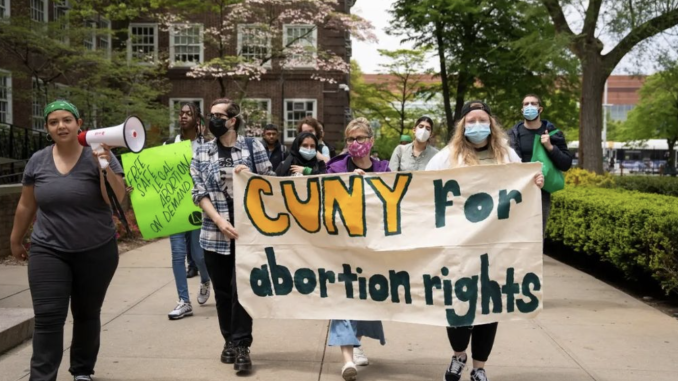
By Serin Sarsour
When a leaked document last May revealed that the U.S. Supreme Court would terminate the constitutional right to get an abortion, millions across America worked to prevent this action from becoming a reality. Many CUNY students, faculty, and staff became part of this movement when they formed a group called CUNY for Abortion Rights. Although the Supreme Court proceeded with the decision to overturn Roe v. Wade, a landmark decision that declared the right to an abortion, the CUNY for Abortion Rights team has continued to push for reproductive rights and justice.
“We hope to send this list of demands to the CUNY leadership about the actions we think they must take to protect those students, given the new status quo,” said Astrid Wik Hallaraaker, a member of the CUNY for Abortion Rights group. “Also, promote more research on reproductive services, reproductive access, and some various things in relation to what sort of immediately is needed from an educational institution to keep us safe.”
Carmen Melillo is also an active member of CUNY for Abortion Rights, and expresses that another one of the group’s initiatives is to promote solidarity and alliance to those directly impacted by the Supreme Court’s decision, along with labor movements that are occurring across the country.
Hallaraaker and Melillo are both students at the CUNY Graduate Center majoring in political science. The two met through a WhatsApp group chat set for the center’s political science department, and they initially formed a group to go to protests together. Though, little did they know they would go on to be a part of something much bigger as they joined CUNY for Abortion Rights around the time it was first initiated in early May.
“The response that we saw, the sort of the main political mainstream protests weren’t sufficient… one of the main reasons why we thought we need to stay working on this,” said Hallaraaker about the duo’s decision to commit to the university-based group.
Melillo also drew a parallel between the group and the political science field the two study. “At its heart, political science is the study of power, the study of social movements. We come from a department in a field that should have something to say about this [reproductive rights], and nothing is being said. So therefore, we must sort of pick up the ball and start moving it,” he explained.
Apart from the list of demands, the “mobilizing” group is organizing a walkout on Oct. 6 at the Graduate Center as they advocate for reproductive justice alongside other graduate students nationwide. During this walkout, the group will present their list of demands to the CUNY Board of Trustees, the university’s top decision-making body.
The group even organized a teach-in for the political science department at the center after Roe v. Wade was overturned. “We wanted to have scholars and activists who knew about historically the reproductive justice movement, the women’s movement, and more broadly, the LGBTQ movement. But we also wanted to have people who could speak directly to how we’re located in this institution, given our historical moment, what can we do?,” said Hallaraaker.
Melillo appreciates that he ultimately gets to learn as he participates in the group. He also highlights the importance of becoming agents for institutional change, especially when organizing within a department and community he is familiar with.
“To simply have this movement is to make a political claim that this institution is ours. This institution runs on us, the students, the workers, the staff, the adjuncts… Therefore, the city itself that the workforce of the city largely runs off of the graduates of this institution, more or less, is ours,” Melillo said.
CUNY for Abortion Rights also wants to bring some political life back to the Graduate Center. “It’s been quite dead after the pandemic and quite empty,” Hallaraaker told the Vanguard. “And I think we’re gradually starting to sort of fill it with political activity again, at least at our department, which I think is important, but also fun and satisfying.”
